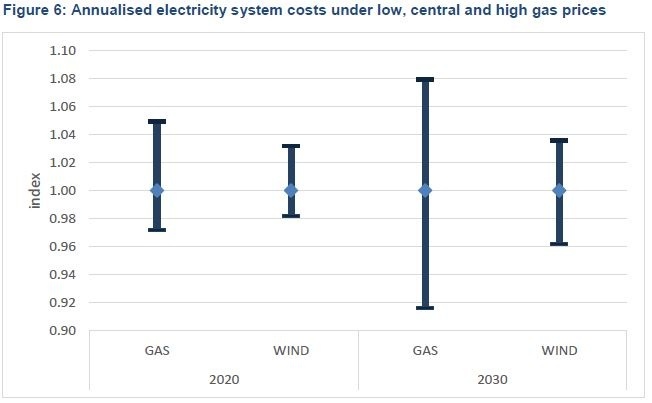Inside UK Wind - Report: Wind Energy induces resilience against future price volatility of fossil fuels
Dwindling domestic gas and coal supplies mean the nation would become dependent on volatile imports, it adds. The report, by Cambridge Econometrics for RenewableUK, said wind power saved the UK £579 million in fossil fuel costs in 2013. The UK is recognised for having the best wind resource in Europe.
“One of the main messages from this report is that in a scenario with a higher content of wind energy, you are less reliant on fossil fuels,” explained co-author Sophie Billington, a researcher from Cambridge Econometrics. “This is a key message, particularly when you consider that the UK – for the past five years or so – has imported more gas than it has produced domestically.”
She states that under a high gas scenario (gas power plants replacing end-of-life coal and nuclear plants) and a 40% increase in gas prices by 30%, electricity prices would increase by 8%. However, under a high wind scenario (wind farms replacing end-of-life coal and nuclear plants), electricity prices would still rise but by only 4%. “For the wind scenario, you have higher upfront capital costs but fewer uncertain variable costs, leading to more price resilience,” Ms Billington added.
The report said that the UK electricity sector had undergone a substantial change in recent decades, shifting from a coal-based system to a more balanced mix “encompassing nuclear and gas-fired power stations, as well as emerging renewable energy technologies”. It observed: “Over the next 10 to 20 years, the energy sector will need to be re-shaped again if the UK’s targets to reduce CO2 emissions are to be met.”
In 2008, the UK established the world’s first legally binding climate change target, requiring governments to reduce greenhouse gas emissions by at least 80% from 1990 levels by 2050. Rob Norris, RenewableUK’s head of communications, said that currently there were “not enough renewables in the system to meet those targets”. “The crucial thing is that energy policy is a long-term game and at the moment we only really know what the government support will be out to 2020" he went on to say.

“What you really need is a long-term vision out to 2030 so then you can plan, especially when it comes to things like large offshore developments.” Mr Norris said he advocated a “rich energy mix so then you do not put all your eggs in one basket”. He added: “If you have different technologies, including renewables, competing against each other then the cost is driven down for the consumer.”
To receive more information on this article, our Newsletter or find out more about what w3.windfair.net has to offer, please, do not hesitate to contact Trevor Sievert at ts@windfair.net.
Please don't forget to follow us on Twitter: w3.windfair.net on Twitter
w3.windfair.net is the largest international B2B internet platform in wind energy – ultimately designed for connecting wind energy enthusiasts and companies across the globe.
- Source:
- Cambridge Econometrics
- Author:
- Edited by Trevor Sievert, Online Editorial Journalist / by Cambridge Econometrics Staff
- Email:
- ts@windfair.net
- Link:
- w3.windfair.net/...